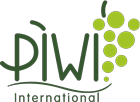Article by Karine Pedneaulta and Caroline Provost in the journal Scientia Horticulturae
Abstract:
Areas dedicated to organic wine production have significantly increased over the last few years. The vast majority of organic wine is made from Vitis vinifera varieties that are highly susceptible to fungal diseases and pests, making organic management difficult for growers. Depending on the growing area, 20-70% of organic growers declare issues with fungal diseases in Europe. Recently, fungus-resistant grape (FRG) varieties have been recommended as the most suitable choice in organic viticulture, especially in areas where disease pressure necessitates high rates of fungicides. FRG varieties could contribute to improved disease management in organic as well as conventional viticulture, reduce production costs and decrease copper accumulation in soils. Recently, many FRG varieties presenting advantageous agronomic attributes and enological characteristics have been developed in North America and Europe for conventional and sustainable farming. In this review, we present an overview of the benefits and limits associated with FRG varieties in addition to the current knowledge regarding berry and wine composition, canopy management, and winemaking challenges and practices.
© 2016 Elsevier BV All rights reserved.

